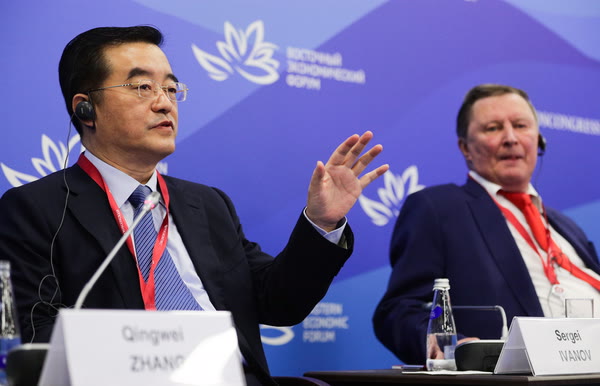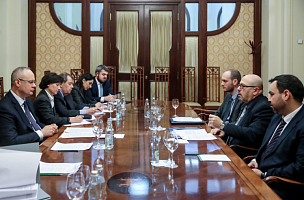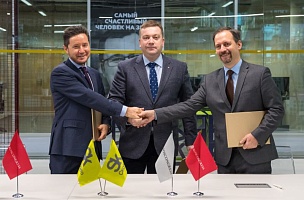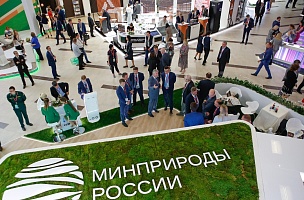KEY CONCLUSIONS
Digitalization is the foundation for effectiveness
“Our world has already become highly digitalized, both in business and everyday life. It is not only the optimization of business, but also the optimization of infrastructure <...> this is a better effectiveness for business and additional money,” Evgeniy Ditrikh, Minister of Transport of the Russian Federation.
Transport plays a crucial role in the digital revolution
“Eurasia is an important corridor for the future development of the world <...> Digital revolution 4.0 is an integral part of the future <...> and transport will play a crucial role,” Suresh Prabhu, Minister of Commerce and Industry of the Republic of India.
Transportation is perfect for digital transformation
“Transportation is perfect <...> for digital transformation <...> a zone of quite mature decisions <...> huge, according to my estimations, up to 35%, potential for economic efficiency growth <...> of the transportation industry. This transformation makes sense <...> when we see it on the scale of Greater Eurasia,” Maxim Akimov, Deputy Prime Minister of the Russian Federation.
Transformation of the transportation system will foster GDP growth
“According to the experts of the Centre for Strategic Research, <...> only as a result of the transformation of the transportation system that is possible over the course of the next five years, we can expect at least one additional GDP point,” Sergei Ivanov, Special Presidential Representative for Environmental Protection, Ecology and Transport.
PROBLEMS
Transit potential of Russia is not fully unlocked yet
“Asia-Pacific Region accounts for the most transportation work, and it is our main resource that Russia as a state <...> with a huge transit potential has not fully unlocked yet,” Maxim Akimov, Deputy Prime Minister of the Russian Federation.
Lack of unified digital standards
“Digital standards are now critically important, because if we have a joint infrastructure, then there should be standards that are compatible with each other,” Suresh Prabhu, Minister of Commerce and Industry of the Republic of India.
“The province of Heilongjiang <...> has 3,000 kilometers of border with Russia <...> We have to expand and maximize cross-border cargo transportation <...> together we have to develop a system of mutual acknowledgement <...> of data exchange, to establish (unified) standards,” Qingwei Zhang, First Secretary of the Heilongjiang Provincial Committee (People’s Republic of China), Communist Party of China.
Information exchange is poor
“We pay a lot of attention to building of the (transport – Ed.) corridor Primorye–2 <...> we have to enhance cooperation for information exchange,” Bayin Chaolu, First Secretary, Jilin Provincial Committee (People’s Republic of China), Communist Party of China.
SOLUTIONS
Coordination between the state and the business
“Ministry of Transport of the Russian Federation supported the initiative on creation of ‘Digital Transport and Logistics’ association put forward by the business <...> Today this initiative is a tool for non-state implementation of digital technologies in the Russian transportation system,” Evgeniy Ditrikh, Minister of Transport of the Russian Federation.
Signing agreements on international transportation
“Signing an agreement on international transportation with China is a pretty global thing. It rises limitations on the volume of traffic, it is a landmark event <...> I assume that we will launch this pilot project in November. This is the first time two interstate platforms are integrated <...> As soon as on 20 September <...> we start a pilot project with Kazakhstan for joint tracking of transit transportation,” Anton Zamkov, General Director, RT-Invest Transport Systems LLC; Representative, Digital Transport and Logistics Association.
“The experiment that we are beginning together with our partners on the order of the government concerning the tracking of transit transportation on the route Russia – Kazakhstan <...> will provide us with a certain base that we <...> will analyse <...> We hope that this experiment will continue as <...> systemic work within the Eurasian Economic Union <...> It is important that this market is transparent,” Timur Maksimov, Deputy Head, Federal Customs Service of the Russian Federation.
“Today we have a unique agreement on creating favourable conditions for international automobile transportation <...> All states (SCO members – Ed.) have adopted it. It gives us 15,000 kilometers of high-speed roads with ‘green channel’ for transportation,” Rashid Alimov, Secretary General, Shanghai Cooperation Organization.
Improving legal framework
“The law ‘On transit transportation in the Russian Federation’ was approved in the first reading <...> I think that by the end of the year the law will be adopted for practical implementation in Russia,” Anton Zamkov, General Director, RT-Invest Transport Systems LLC; Representative, Digital Transport and Logistics Association.
Creation of a unified digital platform for the transport system
“(Digital – Ed.) services increase the accessibility and safety of transport services <...> a huge amount of data is being collected from the transport infrastructure <...> There is a need to consolidate all this into one digital platform for the transport system based on unified standards. We already have similar experience, for example, the unified standard of transport telematics,” Viktor Parakhin, Deputy General Director, ZaschitaInfoTrans of the Ministry of Transport of the Russian Federation FSUE.
“To unlock the transit potential of our country and new opportunities for our partners from EAEU and SCO, we suggest creating a joint unified trusted digital space for our countries’ transport, for example, through consolidation based on the digital platform standard of the member countries <...> To work through these digital technologies <...> I suggest using <...> the experience of the international cooperation for creation of transport corridors Primorye–1 and Primorye–2,” Viktor Parakhin, Deputy General Director, ZaschitaInfoTrans of the Ministry of Transport of the Russian Federation FSUE.
Implementation of digitalization programmes in major companies
“Major Russian transportation companies now have their own digitalization roadmaps <...> Rosavtodor announced the project Karavan for the use of self-driving cars <...> Aeroflot created a special committee, Russian Railways prepared a strategy for railway digitalization,” Sergei Ivanov, Special Presidential Representative for Environmental Protection, Ecology and Transport.
Use of international experience in transport digitalization
“The third pier in Jebel Ali operates almost autonomously. People interfere only in case of conflict. <...> 78 terminals in 40 countries are managed from one place,” Sergey Chemarda, Board Member, DP World Russia.






